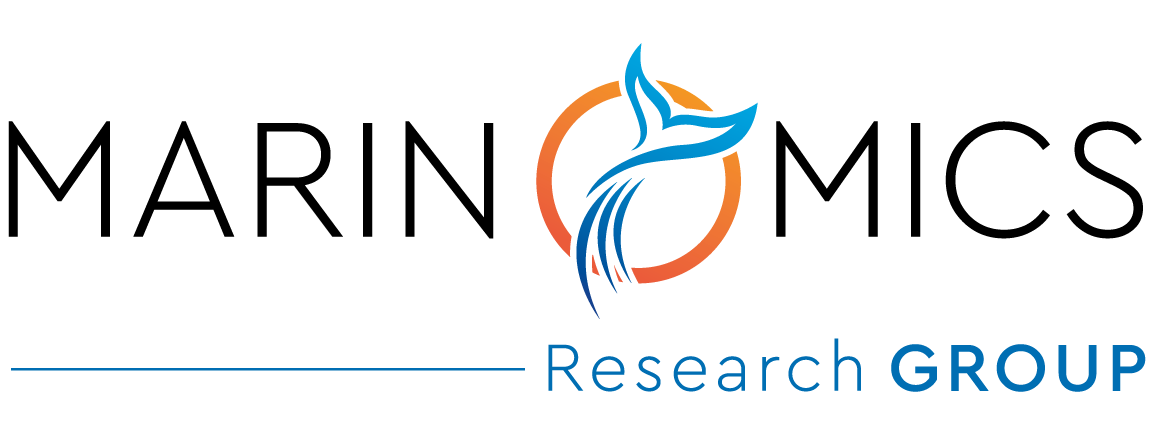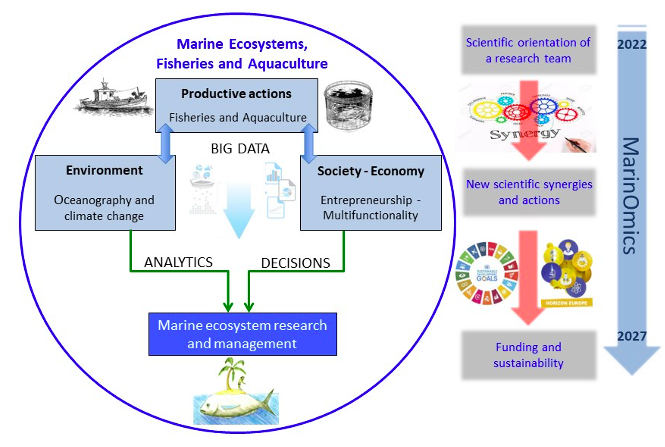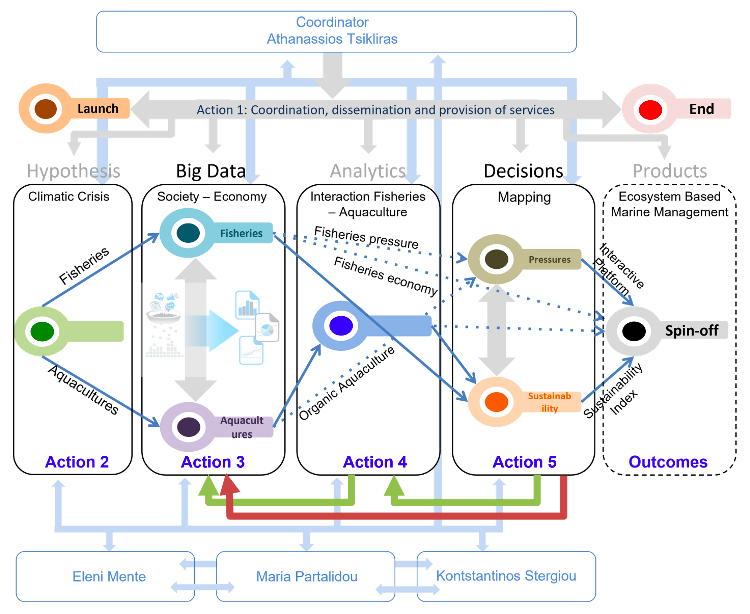
MarinOmics
Marine Ecosystems, Fisheries and Aquaculture Group
The primary goal of the research group is the development of marine ecosystem management in the Mediterranean Sea, which includes a cooperative and holistic (biological, environmental, climatic, fishery, social) approach to the management of marine resources and human capital, while recognizing the importance of the economic and political dimensions.
In the context of the primary objective, the following aims will be implemented:
- to examine the impact of the climate on fisheries and aquaculture and to develop a risk assessment
- to examine the social role and economic viability of fisheries and aquaculture,
- to study the prospects for further development of organic aquaculture and
- to map the fishing pressure and the presence of aquaculture units in the Aegean Sea in order to assess their future impact on the ecosystem (Figure 1).

Figure 1. Summary of the scientific orientation of the research group, new synergies that will be
developed to achieve the primary scientific purpose.
Climate change and risk assessment
The impact of climate change on organisms has been extensively studied and continues to be studied both globally and at Mediterranean level, and the recent MedECC study (Mediterranean Assessment Report on the Effects of Climate Change) is a complete and up-to- date review. However, the direct and indirect impact of climate change on the professional daily lives of workers in the fisheries and aquaculture sectors have not yet been fully assessed in terms of risk. A recent study by the FAO (Food and Agricultural Organization of the United Nations) showed that fishing activities in the eastern Mediterranean will be strongly affected by climate change.
Interdisciplinarity: Cooperation of all members
Social context of fisheries and aquaculture
Within the framework of the primary purpose and within the network that has already been developed in the productive groups of fishers and fish farmers, social and economic indicators will be examined with emphasis on the role of women and the economic viability of productive classes (multifunctionality family units) with alternative income sources (fisheries tourism) and the promotion of their products (certification of fishery products) through new alternative agri-food systems that meet the conditions not only of environmental but also of economic and social sustainability.
Interdisciplinarity: Collaboration of all members, except oceanographers and technologists
Organic aquaculture
In the framework of a Horizon Europe project, bio-sustainable aquaculture will be studied with the aim of sustainable development of aquaculture. Aquaculture is one of the most important sectors of primary animal production and contributes significantly to the economic development of local communities. Organic aquaculture is included in the context of sustainability and the application of the principles of responsible aquaculture, i.e. sustainable and environmentally friendly, with good quality final product and contribution to local development.
Interdisciplinarity: Cooperation of all members
Mapping of actions and ecosystem sustainability index
As part of a H2020 project, an interactive platform will be created (MSP Challenge Simulation Platform – eastern Mediterranean Sea version) that will reflect all the ecosystem functions of the Aegean Sea and the anthropogenic pressures received by the organisms, such as fishing routes and aquaculture units. The platform, which will be operated from KEDEK, will be extended to the entire eastern basin to examine climate, energy and fisheries scenarios in the light of social and economic impacts in the important sectors of fisheries, aquaculture and tourism. An ecosystem sustainability index (ESI) will be developed that will include biological, climatic, fishery and economic indicators and can be used according to the needs of each ecosystem and the availability of data.
Interdisciplinarity: Cooperation of all members

Figure 2. PERT diagram illustrating the interactions between the Actions and between the research team
Research team of AUTH
This interdisciplinary collaboration involves three departments of the Aristotle University of Thessaloniki – Biology, Veterinary Medicine and Agriculture – with four faculty members serving different scientific subjects and several full-time associates (postdoctoral researchers, PhD students, postgraduate and undergraduate students, project manager) covering a wide range of disciplines such as agro-sociology, agronomy, environmental biology, oceanography, fisheries science, marine biology, fish biology, computer science and mathematis.
Athanassios Tsikliras – Coordinator
School of Biology
Marine Ecosystems and Fisheries Lab (MEFL), AUTh
Athanassios Tsikliras – Laboratory of Ichthyology, AUTh
Eleni Mente
School of Veterinary Medicine
Mente Eleni – School of Veterinary Medicine – AUTh
Maria Partalidou
School of Agriculture
Agricultural Economics Department
Konstantinos Stergiou
School of Biology
Konstantinos I. Stergiou – Laboratory of Ichthyology, AUTh
Dimitris Karagiannis
School of Veterinary Medicine
Research Staff
Melina Nalmpanti
Ioannis Keramidas
Danai Mantopoulou – Palouka
Evangelia Daskalaki
Konstantina Stergiou
Adam Galatoulas
Athanassios Lattos
Project manager
Sophia Manousi
IT
Vasilis Vreskos
Outputs
The interactive platform (MSP Challenge Simulation Platform – eastern Mediterranean Sea version) and the Ecosystem Sustainability Index (ESI) are innovative products that combine interdisciplinarity (including biological, environmental, oceanographic, fisheries, social and economic indicators) and wide – scale application, as they can be applied to many levels of geographical and temporal analysis. The end goal of creating an interactive platform is its direct use by end users and the general public or by scientists in their quest to simplify and transfer scientific knowledge. The development of the Ecosystem Sustainability Index (ESI) aims to be established at European level and be widely used to assess the state of marine ecosystems in the context of marine ecosystem management.
The social and economic role of fisheries and aquaculture (especially the role of women) have not been explored nationwide and are expected to provide new scientific data in research and interesting results. These will support a more holistic approach to fisheries and aquaculture management but will also highlight the essential, but invisible, role that women play in important economical areas, especially in non-urban areas.
Finally, the combination of the fields of fisheries and aquaculture, that seem relevant but in fact are very different, in the light of the effects of climate change and their social and economic characteristics is innovative, attempted for the first time in Greece and constitutes interdisciplinary knowledge. It appears that climate change will greatly affect these activities as it affects the marine ecosystem as a whole.
Contact
Marinomics research group – KEDEK: 2310990577 / 990547 / 990548
e-mail: atsik@bio.auth.gr, smanousi@bio.auth.gr
